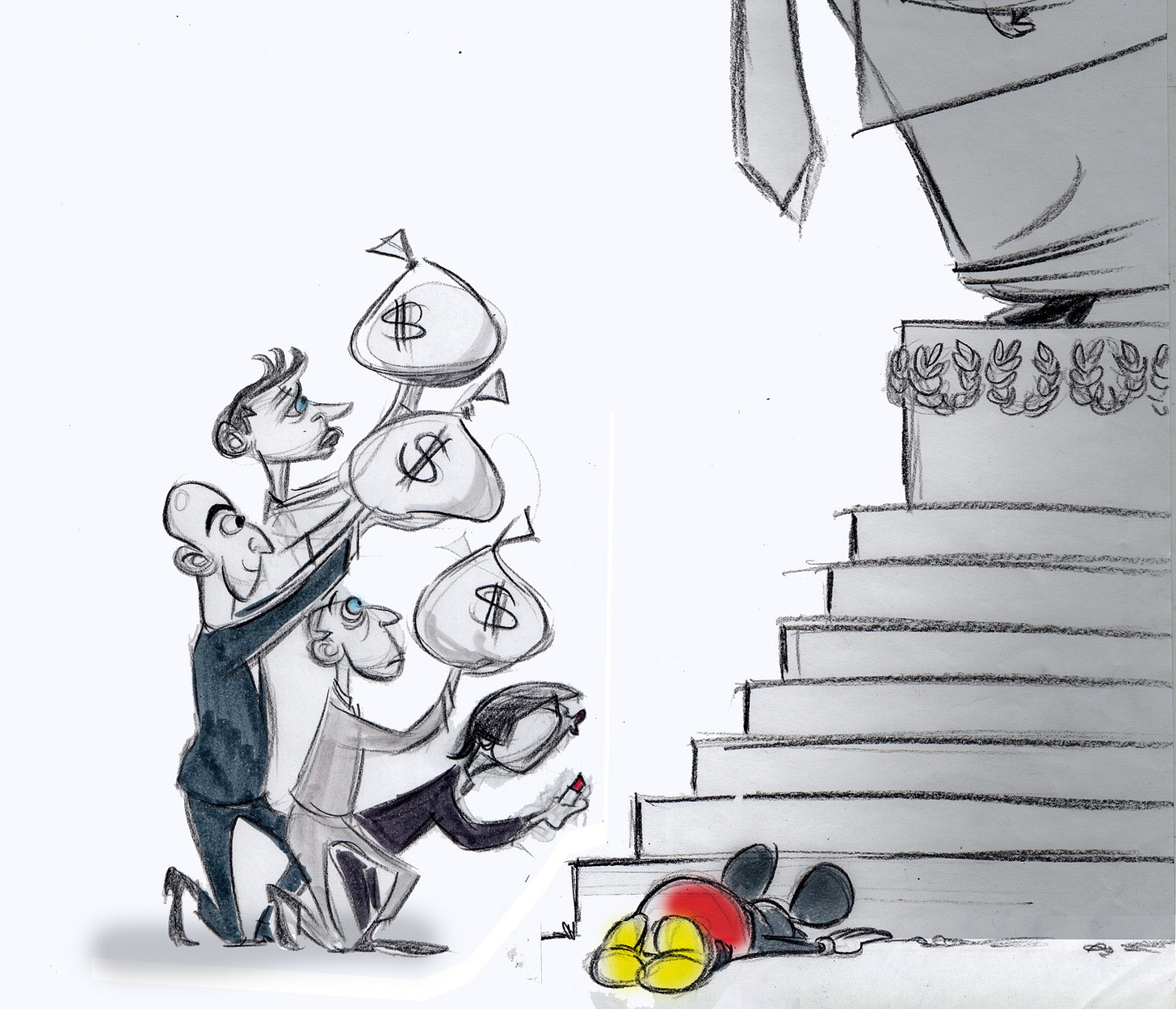
“Our liberty depends on the freedom of the press, and that cannot be limited without being lost.” — Thomas Jefferson
The next time someone tells you that Adam Smith’s “invisible hand” always produces optimum social outcomes, remind them of the Washington Post. The market, manifest in the person of Jeff Bezos, has decided to subordinate the paper’s journalistic integrity to his other vested interests. He owns the thing and is free to do what he likes with it. That’s how free markets work.
What Bezos has decided to do is offer the paper’s reputation as propitiation to Donald Trump. That’s why the Post declined to endorse Kamala Harris last year; why it refused to run the Ann Telnaes cartoon above, prompting her departure; and why Bezos himself has taken over the paper’s opinion pages, which will apparently become a sort of B-string Wall Street Journal. Veteran columnists Ruth Marcus, Eugene Robinson and opinion editor David Shipley have left the paper in protest.
“The Post is a shadow of itself now,” Ms. Telnaes told an audience at New York’s International Film Center last month just after a screening of the documentary “Democracy Under Siege,” in which she figures prominently. “No one trusts it, and I don’t think it’s going to come back, I mean not until things change with the ownership.”
Conflicting goals
What the Post tragedy illustrates is a problem common to what we like to think of as the “free market,” namely the conflict between profit goals and larger social goals — a livable environment, a stable financial system, universal healthcare. It’s because of that conflict that civilized societies don’t leave these essentials entirely to the whims of the marketplace. The state intervenes in one way or another precisely to prevent pure market outcomes in these and other crucial areas.
There’s an additional level of concern when it comes to news media. Newspapers are not just businesses but essential components of the constitutional system as the Framers designed it. A car maker or an airline can fail without threatening the constitutional order. But what if the relentless logic of the marketplace allows no place for the sort of journalism that serves a check on government abuse?
When it comes to local journalism, the question isn’t rhetorical. Thanks partly to the death of the traditional ad-driven business model, more than 3,200 local papers have closed in the U.S. since 2005, leaving 55 million Americans in “news deserts” without reliable local coverage. No autocratic government did this; the market did.
“There are certain things that the commercial market just doesn’t provide anymore, and one of those is local journalism,” former WSJ senior editor Bill Grueskin, now a professor at the Columbia Journalism School, told NPR last week.
Rational actor
From a market fundamentalist’s point of view none of this is problematic. If you’re a parody of Milton Friedman, the only thing that matters is freedom of choice for consumers and producers, and getting prices right. Satisfy those criteria, and all will be well. From that perspective Bezos’s abasement of the Post is a perfectly rational act. After all, he has lots at stake in his relationship with a vengeful Donald Trump, as former Post Executive Editor Martin Baron recently noted in The Atlantic:
Bezos has ample reason to worry about the consequences of any retribution. Federal contracts are key to the success of Amazon Web Services, the cloud-computing division that has been delivering more than half of the company’s profits. An arch-competitor is Oracle, whose founder and chairman is Larry Ellison, the GOP megadonor whom Trump hosted recently at the White House and extolled as “one of the most serious players anywhere in the world.” Bezos’s commercial space venture, Blue Origin, has received billions of dollars from his personal bank account. January’s successful launch into orbit of its New Glenn rocket positions Blue Origin to finally compete with Space X, the pacesetter owned by Trump’s seemingly omnipotent best buddy, Elon Musk. The government will be Blue Origin’s essential customer.
The Framers considered a free press more or less as a fourth branch of government that would keep watch on the other three. They carved out a First Amendment protection to insulate the press from government constraints on the free flow of news and opinion, but there’s no guarantee that markets will allow a space for this fourth branch, or that private actors won’t inhibit the press as effectively as government.
The Jefferson quote above implies that the free press as a concept is indivisible; to compromise it at all is to threaten the whole idea. What we have here is a slippery-slope problem, and Jeff Bezos has just greased the skids.



